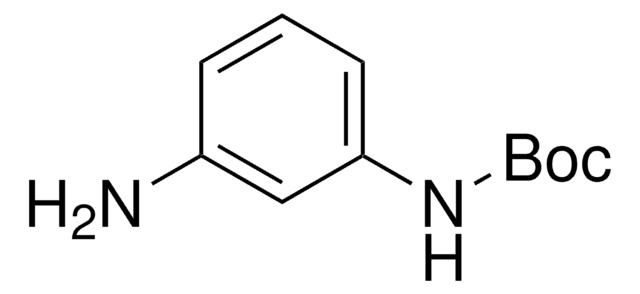15485
N-Boc-p-phenylenediamine
≥97.0% (NT)
Synonym(s):
4-(tert-Butoxycarbonylamino)aniline, tert-Butyl-4-aminophenylcarbamate
Sign Into View Organizational & Contract Pricing
All Photos(1)
About This Item
Linear Formula:
(CH3)3COCONHC6H4NH2
CAS Number:
Molecular Weight:
208.26
Beilstein:
2969618
EC Number:
MDL number:
UNSPSC Code:
12352116
PubChem Substance ID:
NACRES:
NA.22
Recommended Products
Quality Level
Assay
≥97.0% (NT)
form
powder
reaction suitability
reagent type: cross-linking reagent
functional group
Boc
amine
SMILES string
NC1=CC=C(NC(OC(C)(C)C)=O)C=C1
InChI
1S/C11H16N2O2/c1-11(2,3)15-10(14)13-9-6-4-8(12)5-7-9/h4-7H,12H2,1-3H3,(H,13,14)
InChI key
WIVYTYZCVWHWSH-UHFFFAOYSA-N
Application
N-Boc-p-phenylenediamine can be used as:
- A reactant to prepare perylene monoimide-based dyes for dye-sensitized solar cell applications.
- A starting material to synthesize covalent organic frameworks, which are used as proton exchange membranes for hydrogen fuel cell applications.
- A reactant in the synthesis of bestatin derived hydroxamic acids as potent pan-HDAC inhibitors.
Other Notes
Mono-N-acylated diamine, precursor of different Para-substituted anilines (e.g., 4-azido aniline); Synthesis of photoactivable derivative of ouabaine.
Signal Word
Warning
Hazard Statements
Precautionary Statements
Hazard Classifications
Acute Tox. 4 Oral - Skin Sens. 1
Storage Class Code
11 - Combustible Solids
WGK
WGK 3
Flash Point(F)
Not applicable
Flash Point(C)
Not applicable
Personal Protective Equipment
dust mask type N95 (US), Eyeshields, Gloves
Choose from one of the most recent versions:
Already Own This Product?
Find documentation for the products that you have recently purchased in the Document Library.
Customers Also Viewed
Synthesis, photophysical and photovoltaic investigations of acceptor-functionalized perylene monoimide dyes for nickel oxide p-type dye-sensitized solar cells
Le Pleux L, et al.
Energy & Environmental Science, 4(6), 2075-2084 (2011)
Combined Intrinsic and Extrinsic Proton Conduction in Robust Covalent Organic Frameworks for Hydrogen Fuel Cell Applications
Yang Y, et al.
Angewandte Chemie (International ed. in English), 59(9), 3678-3684 (2020)
Development of a Bestatin-SAHA Hybrid with Dual Inhibitory Activity against APN and HDAC
Cao J, et al.
Molecules (Basel), 25(21), 4991-4991 (2020)
E. Escher et al.
Helvetica Chimica Acta, 62, 1217-1217 (1979)
M.P. Goeldner et al.
Trends in Biochemical Sciences, 7, 310-310 (1982)
Our team of scientists has experience in all areas of research including Life Science, Material Science, Chemical Synthesis, Chromatography, Analytical and many others.
Contact Technical Service

![4-[(N-Boc)aminomethyl]aniline 97%](/deepweb/assets/sigmaaldrich/product/structures/341/155/530c425c-7e6e-435e-a28a-9d40b05b938a/640/530c425c-7e6e-435e-a28a-9d40b05b938a.png)








